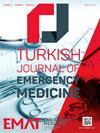The end-of-life care in the emergency department setting with respect to the Middle East countries and comparison with the Western countries
IF 1.1
Q3 EMERGENCY MEDICINE
引用次数: 0
Abstract
Patients who are affected with severe chronic illness or in need for end-of-life care ((EOLC), they are mainly treated in the emergency departments (EDs) to provide the utmost amount of care for their condition. The major aspects which impact the accessibility of care in the ED include the clinical, social, and economic factors in different regions of countries. In recent years as the EOLC has been provided, it has been observed that patients experiencing EOL and dealing with a dying process do not always achieve the experience what resonates with a good death. The main cause of concern for these patients is the problem that in the ED they do not have access to palliative care options, mainly the ones who are suffering from noncancer ailments. These patients are provided palliative care at a very later stage in the ED when they could have been provided with palliative management at home in an earlier manner. EOLC plays a very critical role in ensuring that terminally ill patients are given a proper and adequate amount of care. The present article aims to highlight the EOLC in the ED in the Middle-Eastern regions. We aim to present a broader view that has impacted the current situation of EOLC in the Middle East regions and demonstrate a description of the EOLC in an ED setting between the Middle Eastern regions and western culture focusing on the following five important factors: Situation acceptance in the ED, cultural compatibility of bioethics, treatment perspective, skills among clinical providers and physician's attitude. In this literature review, we present the evidence associated with the EOLC in the ED setting with respect to the Middle East countries and bring out their differences in the religious, clinical, social, ethical, and economic aspects in comparison with the Western countries. We also tried to determine the differences between the two regions in terms of the principle of explaining the fatal diagnosis or poor prognosis, family relations, and do-not-resuscitate decision. This comparative analysis will help to bring out the gaps in the quality of care in the ED in the Middle East countries and promote the development of well-assessed policies and strategies to improve EOLC. The findings of this study and the future interventions that can be implemented to improve the structure and design of the EOLC that will act as a guiding force to execute evidence-based quality improvement program.临终关怀在急诊科的设置相对于中东国家及与西方国家的比较
患有严重慢性疾病或需要临终关怀的病人,主要在急诊科接受治疗,以便为他们的病情提供最大程度的护理。影响急诊科护理可及性的主要方面包括国家不同地区的临床、社会和经济因素。近年来,随着EOLC的提供,人们观察到,经历EOLC和处理死亡过程的患者并不总能获得与良好死亡相共鸣的体验。这些患者最担心的问题是,他们在急诊科没有获得姑息治疗的选择,主要是那些患有非癌症疾病的患者。这些病人在急诊科的很晚阶段才得到姑息治疗,而他们本可以在家里更早地得到姑息治疗。EOLC在确保绝症患者得到适当和充分的护理方面发挥着非常关键的作用。本文的目的是强调在中东地区的经济发展的EOLC。我们的目标是呈现一个更广阔的视角,影响了中东地区EOLC的现状,并展示了中东地区和西方文化之间的ED环境中的EOLC的描述,重点关注以下五个重要因素:ED的情况接受度,生物伦理的文化兼容性,治疗观点,临床提供者的技能和医生的态度。在这篇文献综述中,我们提出了与中东国家ED环境中EOLC相关的证据,并提出了与西方国家相比,他们在宗教、临床、社会、伦理和经济方面的差异。我们还试图确定两个地区在解释致命诊断或预后不良、家庭关系和不复苏决定的原则方面的差异。这一比较分析将有助于找出中东国家在产科护理质量方面的差距,并促进制定经过良好评估的政策和战略,以改善EOLC。本研究的发现和未来可以实施的干预措施,以改善EOLC的结构和设计,将作为执行循证质量改进计划的指导力量。
本文章由计算机程序翻译,如有差异,请以英文原文为准。
求助全文
约1分钟内获得全文
求助全文
来源期刊

Turkish Journal of Emergency Medicine
EMERGENCY MEDICINE-
CiteScore
1.70
自引率
0.00%
发文量
30
审稿时长
22 weeks
期刊介绍:
The Turkish Journal of Emergency Medicine (Turk J Emerg Med) is an International, peer-reviewed, open-access journal that publishes clinical and experimental trials, case reports, invited reviews, case images, letters to the Editor, and interesting research conducted in all fields of Emergency Medicine. The Journal is the official scientific publication of the Emergency Medicine Association of Turkey (EMAT) and is printed four times a year, in January, April, July and October. The language of the journal is English. The Journal is based on independent and unbiased double-blinded peer-reviewed principles. Only unpublished papers that are not under review for publication elsewhere can be submitted. The authors are responsible for the scientific content of the material to be published. The Turkish Journal of Emergency Medicine reserves the right to request any research materials on which the paper is based. The Editorial Board of the Turkish Journal of Emergency Medicine and the Publisher adheres to the principles of the International Council of Medical Journal Editors, the World Association of Medical Editors, the Council of Science Editors, the Committee on Publication Ethics, the US National Library of Medicine, the US Office of Research Integrity, the European Association of Science Editors, and the International Society of Managing and Technical Editors.
 求助内容:
求助内容: 应助结果提醒方式:
应助结果提醒方式:


